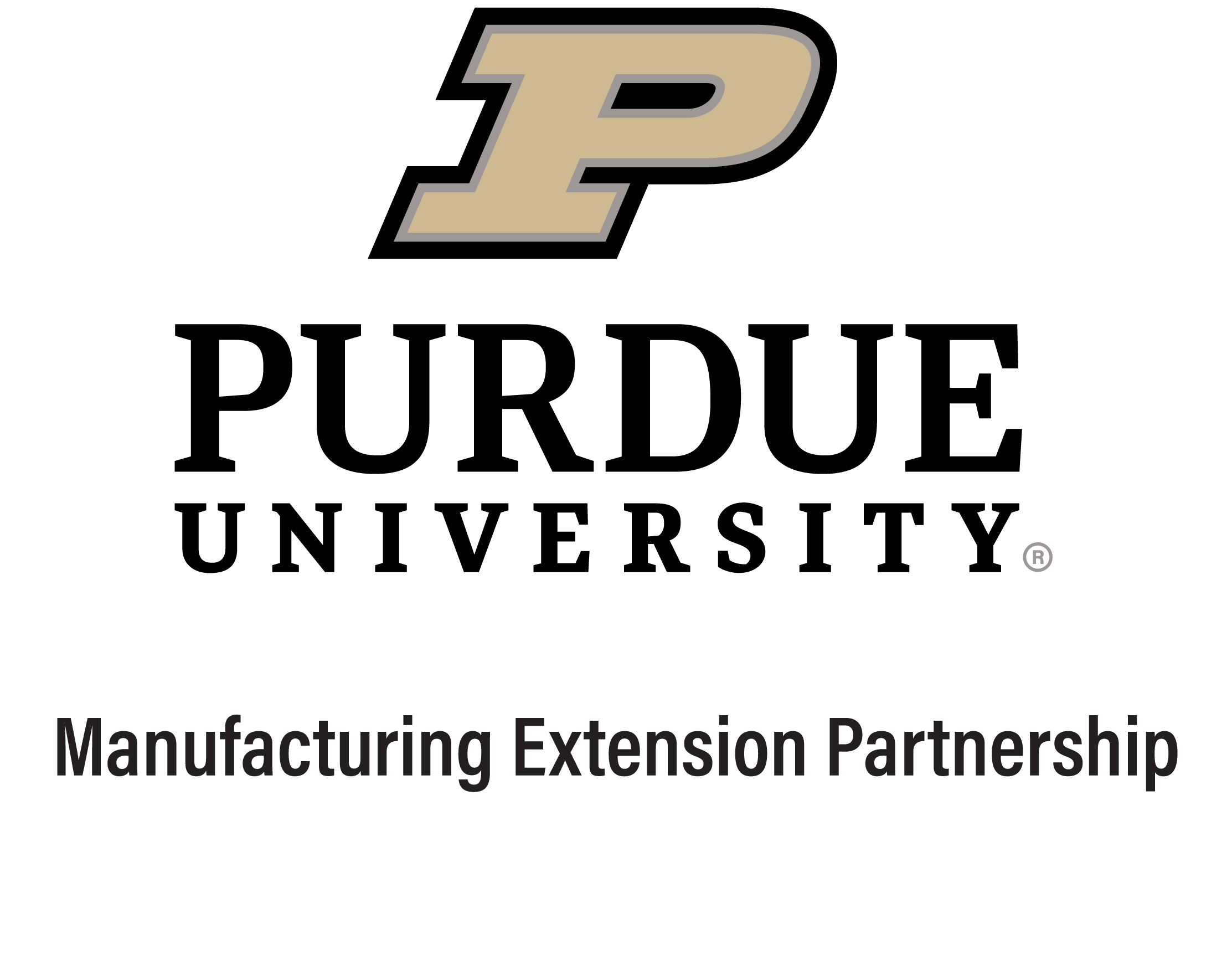Course Detail: MFG400 - Lean Practitioner II Certificate

The Mission:
To advance economic prosperity, health, and quality of life in Indiana and beyond. Purdue Manufacturing Extension Partnership (MEP) provides high value, affordable solutions to help businesses increase profitability. As advocates for Indiana's thousands of manufacturers, our staff leverages resources in both the public and private sectors to help identify areas of improvement, streamline processes, and ultimately increase competitiveness.
Intended audience: Manufacturing personnel, including technicians, engineers, and managers
Lean Practitioner II Certificate
Workshop 1 - Cellular Flow Manufacturing
Pull-Kanban is a lean technique used to control the flow of work by replacing only what has been consumed. A Pull-Kanban system can result in increased productivity and efficiency and reduced waste.In this workshop, you will learn the steps for implementing a Pull-Kanban system and the keys to successful implementation in your environment.
- Describe the difference between a pull system and a push system
- Identify opportunities to introduce pull systems
- Decide how to manage demand to meet customer requirements
- Locate and size supermarkets in the system
- Calculate order points and order quantities
- Select and implement appropriate pull signals
- Describe ways to monitor and fine-tune a pull system
Workshop 3 - Problem Solving Using PDCA, A3, and Root Cause Analysis
Participants will learn about the Plan, Do, Check, Act (PDCA) problem-solving method. In addition, you will learn about problem-solving tools and activities, including A3, root cause analysis, process mapping, cause and effect diagrams, and others.
Objectives:
- Define "problem" and identify problem-solving skills
- Identify barriers to problem solving
- List the benefits of using a structured problem-solving method
- Explain the A3 problem-solving form and how it is used
- Describe the goals of each Plan-Do-Check-Act (PDCA) step and activities that take place during each step
- Define "root cause" and distinguish between root causes and symptoms
Standard Work: This portion of the workshop will provide you with the information and practice you need to participate in implementing standardization and standard work in your workplace. This workshop presents an approach to implementing standardization and standard work methods designed to eliminate waste from production processes. The methods and goals discussed in this workshop are closely related to the lean manufacturing system.
Error Proofing: This portion of the workshop covers using simple, usually low-cost devices, fixtures, and procedures to reduce/eliminate errors and stop errors before defective parts are created.
Workshop 5 - Kaizen Event Facilitation
- Describe the purpose, goals, and typical flow of a Kaizen event
- Write an effective problem statement for a Kaizen event
- List and describe tools used during a Kaizen event, including root cause analysis, 5 Whys, and an A3
- List and describe roles and responsibilities of participants, including the sponsor, team leader, and team members
- Describe techniques for working effectively as a team
To register for individual workshops, visit the below links:
Inventory Management Using Pull-Kanban
Problem Solving Using PDCA, A3, and Root Cause Analysis
Standard Work & Error Proofing Techniques
This program will be delivered online. Classes will be facilitated by a live instructor during the scheduled course times. Participants should have a computer with a strong internet connection, a working microphone, and speakers. Students are required to utilize the camera and microphone to participate in these interactive workshops. Class participation enhances the online learning experience. Your instructor will send a meeting link to all students once registration has closed.
 About the Instructor: Dane Bohnert has over 20 years of Lean and Quality Improvement experience. He has worked as a Quality Engineer, Launch Project Manager, Value Stream Operations Manager, Quality Manager, Supplier Development Specialist, Continuous Improvement Manager, Value Stream Coach, and Lean Consultant and Trainer.In addition, Dane holds certifications in Lean, Six Sigma, and Quality Assurance. He also received training and mentoring directly from Taiichi Ohno protégés Seizo Okamoto and Kazuhiro Sekiya, as well as others with wisdom in Toyota Production System (TPS) and the Toyota Way.
About the Instructor: Dane Bohnert has over 20 years of Lean and Quality Improvement experience. He has worked as a Quality Engineer, Launch Project Manager, Value Stream Operations Manager, Quality Manager, Supplier Development Specialist, Continuous Improvement Manager, Value Stream Coach, and Lean Consultant and Trainer.In addition, Dane holds certifications in Lean, Six Sigma, and Quality Assurance. He also received training and mentoring directly from Taiichi Ohno protégés Seizo Okamoto and Kazuhiro Sekiya, as well as others with wisdom in Toyota Production System (TPS) and the Toyota Way.
